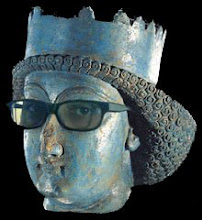 Okay, so I don't know how to define success in the via positiva, but I like to think I know what isn't a good definition. Of course, a definition is based upon the perspective of the person. So, if someone's end goal is to have a lot of money, then they have achieved success when they get a large bank account. However, I am trying to figure out what it means to be successful from a "Kingdom of God" frame of mind. That forces another caveat... who the heck am I to determine what a "Godly point of view" is? I guess I am someone who is attempting to humbly (as much as that is possible) work this question out in the context of my own wrestling with God. A "Kingdom of God" perspective is therefore MY perspective based on MY understanding of scripture, tradition, history, eschatology, soteriology, christology, and probably a little bit of astrology (basically, everything I know about life I learned from a fortune cookie anyway). I am in no way trying to say that this is the only interpretation consistent with Christianity... just the one that makes sense to me.
Okay, so I don't know how to define success in the via positiva, but I like to think I know what isn't a good definition. Of course, a definition is based upon the perspective of the person. So, if someone's end goal is to have a lot of money, then they have achieved success when they get a large bank account. However, I am trying to figure out what it means to be successful from a "Kingdom of God" frame of mind. That forces another caveat... who the heck am I to determine what a "Godly point of view" is? I guess I am someone who is attempting to humbly (as much as that is possible) work this question out in the context of my own wrestling with God. A "Kingdom of God" perspective is therefore MY perspective based on MY understanding of scripture, tradition, history, eschatology, soteriology, christology, and probably a little bit of astrology (basically, everything I know about life I learned from a fortune cookie anyway). I am in no way trying to say that this is the only interpretation consistent with Christianity... just the one that makes sense to me.I belong to a leadership organization (not gonna lie, mostly for the member perks and value it adds to a grad school application and/or résumé). Each month, they bring in (or participate via satellite) a speaker on leadership, motivation, success, etc. Too be blunt, I have not been impressed. Last month's speaker in particular made me consider quitting. To sum up his speech, you are successful if you determine your purpose and live out of that. Anything that is not 100% a part of your purpose should be abandoned. To find your purpose you need to figure out what you enjoy doing, the key quality will be that it brings little-to-no stress in your life, and do it... that is your purpose. Basically, he said to find what makes you happy, do that, and damn the consequences to everyone else.
He also spoke a lot about God (which was sort of strange since this is a secular organization on a state university campus... but his references seemed genuine and not contrived so they were very easy to overlook if you were not religious), but his version of God seemed to be a deity who desires for all of us to be happy. In fact, I think he said that exact phrase, "God wants you to be happy." Purpose brings happiness. All in all, it sounded very health and wealth gospel to me.
I disagree that God wants us to be happy or that happiness is in any way associated with success. Joy is a different matter. I believe that 'happy' is an emotion while 'joy' is a state of mind. I can choose to be joyful (in all circumstances even... 1Thess. 5:16), but I will NOT always be happy. It is dangerous to tell people that success is dependent upon feeling happy and without stress. It is deceitful to say that if you are doing what God wants you to do then you will always be happy and carefree. It is simply not true.
I have not found what success (on a grand scale) means, but I am positive it is not what that speaker espoused.



